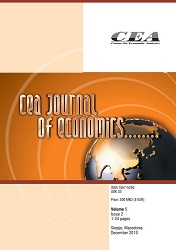THE POVERTY REDUCING EFFECT OF HEALTH - THE CASE OF REPUBLIC OF MACEDONIA
THE POVERTY REDUCING EFFECT OF HEALTH - THE CASE OF REPUBLIC OF MACEDONIA
Author(s): Shenaj Hadzimustafa, Marjan Nikolov, Remzije RakipiSubject(s): National Economy, Health and medicine and law
Published by: Центарот за економски анализи (ЦЕА)
Keywords: economic development; health; inequality; income distribution; poverty
Summary/Abstract: Beyond its intrinsic value for individuals, improving and protecting health is also central to overall human devel-opment and to the reduction of poverty. Enjoying the highest attainable standard of health is one of the funda-mental rights of every human being without distinction of race, religion, political belief and economic or social condition. Good health contributes to development through a number of pathways, having a macroeconomic impact, intergenerational spillover effects that are clearly shown in micro-economic activities, not least in the household itself. Based on this, the aim of this study is to examine the impact of the health costs of reducing the poverty in the Republic of Macedonia, this specifically by excluding the health cost from the poor family budgets, and to, therefore, reduce the inequality in the country. The at-risk-of-poverty rate in the Republic of Macedonia in 2015 is 21.5% and the Gini coefficient 33.7%.The study examines health cost based on available official data from the State Statistical Office (Household Consumption in the Republic of Macedonia and Laeken poverty indicators) from the period of 2005-2015. Findings show that if we exclude the costs for health from the cost structure, the poverty line would be reduced by 3% on average and the number of poor reduced for 15 000 persons in average. Therefore the health system in the country should be based on the pro-poor approach, be more fair and responsive to the needs of people.
Journal: CEA Journal of Economics
- Issue Year: 12/2017
- Issue No: 2
- Page Range: 5-16
- Page Count: 12
- Language: English

